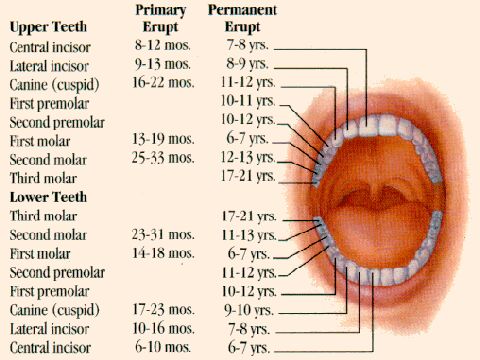
Dental Patient Education
|
Infant Care |
|
|
|
It is important that babies get enough calcium to insure that strong teeth are forming within the jaw bones. And, to help prevent tooth decay (cavities), your pediatrician or dentist may recommend fluoride supplements in the first months following birth if the drinking water in your community is not fluoridated. Ask your pediatrician or dentist. Once your baby's primary (or baby) teeth break through the gums, it is
important to begin cleaning the teeth at least once a day. And never put your baby to bed
with a bottle of milk or juice. Your baby could develop baby bottle tooth decay, which can
be so destructive to your baby's teeth that the teeth cannot be restored. Frequently Asked Questions When will my baby's primary (or baby) teeth begin to appear? Although each baby is different, most babies begin teething between six and eight months after birth. The first teeth to appear are typically the two lower front teeth (central incisors) followed by the two upper front teeth. The complete set of 20 primary teeth should occur by the age of three. If your baby is feeling some discomfort, use a teething gel, to help ease the pain. Or give your baby a very cold or frozen teething ring. When should I start caring for my baby's teeth? As soon as your baby's teeth appear, clean them with a piece of gauze or a damp washcloth at least once a day or after each feeding. When all of the baby teeth are in, brush them gently with a fluoride toothpaste, using a pea-sized dab of toothpaste. Also use an extra soft, children's toothbrush. It helps to have your baby lay his or her head on your lap so you can see the teeth better when you brush. After brushing, make sure your child spits out all of the toothpaste and rinses with water. Why are baby teeth so important? Even though primary (baby) teeth eventually fall out, they reserve space for your child's permanent teeth. So if a tooth is lost too early, new teeth could grow in crooked. At what age should my child begin to see the dentist? When your child is about one year old, it's time for a visit to the dentist. The dentist will examine your child's teeth and gums, make sure that the face and jaws are developing normally, and show you how to clean your child's teeth properly. Be low key about the visit; your child has no reason to be afraid unless it's suggested. And take cues from your dentist and hygienist-we're experienced in dealing with children and want the experience to be a positive one. Should my child be receiving additional fluoride? Fluoride makes teeth stronger and more resistant to cavities. Children who drink fluoridated water from birth can greatly reduce cavities. If your water does not have enough fluoride, your pediatrician or dentist may recommend fluoride drops or tablets for your child. If you have questions about fluoride, ask your pediatrician or dentist. Or call your local water district to determine whether your water supply contains fluoride. How can we help avoid cavities? Out of all age groups, children are the most cavity-prone. It's important that you help brush your baby's teeth after each feeding with a fluoride toothpaste, and an extra soft children's toothbrush. Brushing removes plaque, the colorless film of bacteria that forms on teeth daily and leads to tooth decay and gum disease. A well-balanced diet and limited snacking also promote good oral health. What is baby bottle tooth decay? Baby bottle tooth decay is the creation of many cavities on your baby's teeth so that only the "stumps" of the teeth can be seen. This condition can occur after only a few weeks of putting your baby to sleep with milk or juice in his or her baby bottle. Because your baby's tooth enamel (the hard outer "shell" of a tooth) is fairly soft, your baby is very vulnerable to tooth decay. Often, there is so much tooth decay that your baby's teeth cannot be restored. What should I do if my baby's tooth is knocked out?
|
|
|
| © Copyright 1996 - 2008 HIVdent.org. All Rights Reserved. | ||
